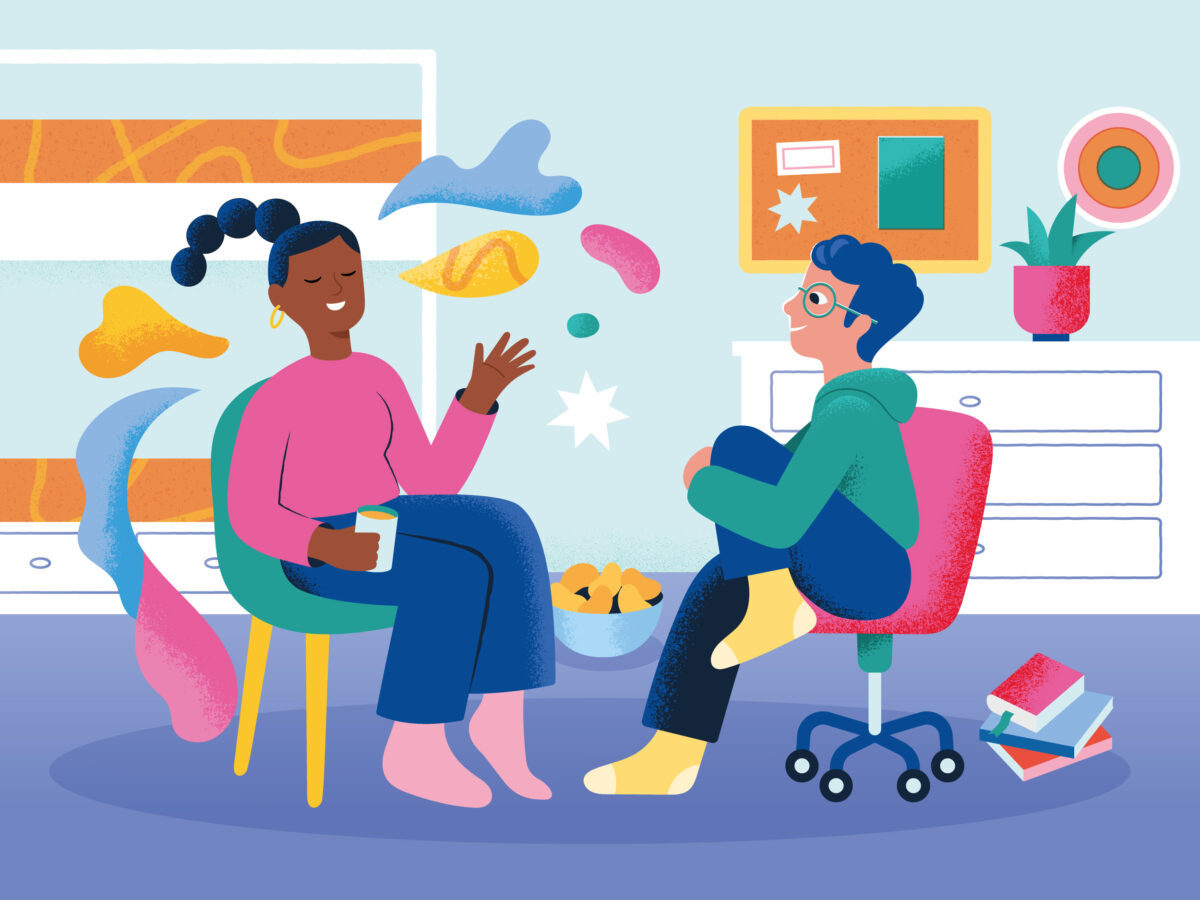Front-line support network

Clinician Jo Mautz and Health and Human Development Instructor Brandon Thomas on Exeter’s Student Listener Program
It’s 8 p.m. on a Monday night in the Phillips Church basement. We greet the assembled group of 45 student listeners with snacks and a positive spirit as we settle in for our “mindful minute,” an intentional activity to center ourselves. As coordinators of the Student Listener Program, we use this biweekly, scheduled meeting time to check in about what’s happening on campus and in the dorms and discuss logistics of an upcoming assembly in which we’ll share information about the role of student listeners on campus. Two seniors, based on their own research and a pre-meeting review with us, then lead a training on the topic of homesickness, complete with a PowerPoint presentation and a Kahoot! exercise to test our knowledge. As the meeting lets out, a few students stay behind to run some hypotheticals by us in an effort to help peers they’re concerned about.
In the face of worry, stress and loneliness, any Exeter student can knock on dorm room doors with the familiar blue signs to talk with a student listener. Rising uppers become listeners through a complex and collaborative process that entails a personal application, faculty recommendation and dorm feedback; trustworthiness, approachability and respect from peers and adults all factor into their selection. Once appointed, student listeners undergo biweekly training throughout the academic year on topics such as anxiety, homesickness, depression, roommate issues, disordered eating, drugs and alcohol, and supporting LGBTQIA+ students. These meetings cover many aspects of the position, including planning events in the dorm and how to appropriately respond to different situations. This dedicated time ensures that listeners are perceived as a “safe outlet” for the dorm as a whole.
It is developmentally appropriate that teenagers when in distress go to peers first, so student listeners are the front-line support networks for students at Exeter. Besides offering private support, they can also connect their peers with appropriate Academy resources. Most issues are kept confidential, unless a student listener believes someone has been harmed or is a danger to oneself or others. Should an issue extend beyond the scope of a peer-to-peer conversation, listeners are trained to reach out to a trusted adult and are supported by on-call counselors at the Lamont Health and Wellness Center, the dean on duty and Campus Safety as needed.
Counseling and Psychological Services collaborates with the Health and Human Development Department to oversee the Student Listener Program. This has been a wonderful partnership, as we weave together our respective disciplines to promote health and wellness on campus. But it’s not strictly business with student listeners, as the students say. We attempt to model living a balanced life. Whether it’s telling jokes, breaking into song or students giving each other shout-outs for their accomplishments in athletics, theater or music, Student Listener meetings have an air of positivity, peace and fun.
On the day of our assembly, we gather onstage in the Assembly Hall, wearing our Student Listener T-shirts. After we speak about our role on campus, we play a short music video of a day in the life of a listener. It’s electric to come together to promote the work we do. As Bruno Mars’ “You Can Count on Me” fills the hall, we hope students take away our guiding principles: When in doubt, reach out. Look for the blue door tag. And never hesitate to knock.
A Short History of the Student Listener Program
The Student Listener Program started with a handful of listeners in the spring of 1983. Pioneering counselors Jan Eaton, Patty Schwartz and Connie Morse co-founded the program and established many tried-and-true traditions over the years, including the annual fall retreat and community-building dorm events. As Ms. Morse would say, “We do not want students worrying alone about their peers — we want them to reach out to grown-ups and seek help. Many have helped students access help and counseling over the years and have made a big difference in a student’s life by being there in hard times.”
The program has undergone some recent changes, including asking listeners for a two-year commitment to help with continuity and mentorship of younger students. We have also streamlined the number of listeners in each dorm/house to ensure proper supervision and support. Yet our goal and mission have remained the same: to ensure that students feel heard not only in their dorms, but also in the larger school community, and to give students a familiar face and access to whatever they need to unlock their best selves.
Jo Mautz is a licensed clinician and counselor in the Lamont Health and Wellness Center. Brandon Thomas is an instructor in the Health and Human Development Department. Mautz and Thomas coordinate Exeter’s Student Listener Program.
This article was originally published in the Winter 2025 issue of The Exeter Bulletin.